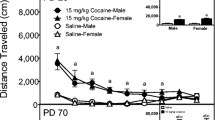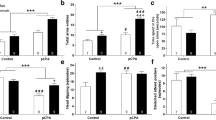Abstract
In an attempt to examine the ability of brain dopamine (DA) depletion to alter learning ability in the developing rat, the rate of acquisition of a positively reinforced lever pressing response was examined in rats during days 30–45 of life following treatment with desmethylimipramine (DMI, 20 mg/kg IP) and 6-hydroxydopamine (6-OHDA, 35 μg intraventricularly) at 3 and 6 days of age, respectively. The 6-OHDA treatment produced a 40%–70% reduction of brain DA without altering growth rate, water intake, or locomotor activity. On the average, water-deprived control rats achieved the criterion for acquisition (50 reinforced lever presses/h) on a fixed-ratio 1 schedule of water reinforcement after 3.1±0.5 sessions (mean ± SEM). In contrast, nearly one-fourth of the DMI + 6-OHDA-treated rats failed to acquire the response after 16 sessions and the remaining 6-OHDA-treated rats required more than twice as long as controls for acquisition (7.8±0.7 sessions). These results suggest that brain DA depletion in neonatal life can impair the acquisition of an operant response during development and that this deficit is independent of changes in growth rate or locomotor activity.
Similar content being viewed by others
References
Ackerman PT, Dykman RA, Peters JE (1977) Teehage status of hyperactive and nonhyperactive learning-disabled boys. Am J Orthopsychiatry 47:577–596
Cooper BR, Breese GR, Grant LD, Howard JL (1973) Effects of 6-hydroxydopamine treatments on active avoidance responding: Evidence for involvement of brain dopamine. J Pharmacol Exp Ther 185:358–370
Delacour J, Echavarria MT, Senault B, Houcine O (1977) Specificity of avoidance deficits produced by 6-hydroxydopamine lesions of the nigrostriatal system of the rat. J Comp Physiol Psychol 91:875–885
Erinoff L, MacPhail RC, Heller A, Seiden LS (1979) Age-dependent effects of 6-hydroxydopamine on locomotor activity in the rat. Brain Res 164:195–205
Heffner TG, Seiden LS (1979) The effect of depletion of brain dopamine by 6-hydroxydopamine on tolerance to the anorexic effect of amphetamine and fenfluramine in rats. J Pharmacol Exp Ther 208:134–143
Heffner TG, Hartman JA, Seiden LS (1980) A rapid method for the regional dissection of the rat brain. Pharmacol Biochem Behav 13:453–456
Heffner TG, Seiden LS (1982) Synthesis of catecholamines from 3H-tyrosine in brain during the performance of operant behavior. Brain Res 183:403–419
Heffner TG, Seiden LS (1982) Possible involvement of serotonergic neurons in the reduction of locomotor hyperactivity caused by amphetamine in the neonatal rats depleted of brain dopamine. Brain Res (in press)
Heller A, Heffner T, Kotake C, Miller F, Seiden L (1981) Locomotor hyperactivity in neonatal rats following lesions of mesocortical dopaminergic neurons. Neurosci Abstr 7:400
Keller R, Oke A, Medford I, Adams RN (1976) Liquid-chromatographic analysis of catecholamines: Routine assay for regional brain mapping. Life Sci 19:995–1004
Lane E (1957) Spectrophotometric and turbidometric methods for measuring proteins. In: Colwick SP, Kaplan NO (eds) Methods in enzymology, vol 3. Academic, New York, pp 447–454
Lloyd KG, Hornykiewicz O (1975) Catecholamines in regulation of motor function. In: Friedhoff A (ed) Catecholamines and Behavior, vol 1. Plenum, New York, pp 41–57
Mendelson W, Johnson N, Stewart MA (1971) Hyperactive children as teenagers: A follow-up study. J Nerv Ment Dis 153:273–279
Miller FE, Heffner TG, Kotake C, Seiden LS (1981) Magnitude and duration of hyperactivity following neonatal 6-hydroxydopamine is related to the extent of brain dopamine depletion. Brain Res 229:123–132
Schoenfeld RI, Seiden LS (1969) Effect of alpha-methyltyrosine on operant behavior and brain catecholamine levels. J Pharmacol Exp Ther 167:319–327
Seiden LS, Carlsson A (1963) Temporary and partial antagonism by l-dopa of reserpine-induced suppression of a conditioned avoidance response. Psychopharmacologia 4:418–423
Shaywitz BA, Yager RD, Klopper JH (1976a) Selective brain dopamine depletion in developing rats: An experimental model of minimal brain dysfunction. Science 191:305–308
Shaywitz BA, Klopper JH, Yager RD, Gordon JW (1976b) Paradoxical response to amphetamine in developing rats treated with 6-hydroxydopamine. Nature 261:153–155
Shaywitz BA, Pearson DA (1978) Effects of phenobarbital on activity and learning in 6-hydroxydopamine-treated rat pups. Pharmacol Biochem Behav 9:173–179
Smith RD, Cooper BR, Breese GR (1973) Growth and behavioral changes in developing rats treated intracisternally with 6-hydroxydopamine: Evidence for involvement of brain dopamine. J Pharmacol Exp Ther 185:609–619
Snapper AG, Stephens KR, Cobez RI, VanHaanen F (1976) The SKED Manual 2:OS/8 and time share SKED. SKED Users Group, Kalamazoo MI
Weiss G, Hechtman L (1979) The hyperactive child syndrome. Science 205:1348–1354
Wender PH (1975) The minimal brain dysfunction syndrome. Annu Rev Med 26:45–61
Zis AP, Fibiger HC, Phillips AG (1974) Reversal by l-dopa of impaired learning due to destruction of the dopaminergic nigro-striatal projection. Science 185:960–962
Author information
Authors and Affiliations
Rights and permissions
About this article
Cite this article
Heffner, T.G., Seiden, L.S. Impaired acquisition of an operant response in young rats depleted of brain dopamine in neonatal life. Psychopharmacology 79, 115–119 (1983). https://doi.org/10.1007/BF00427796
Received:
Accepted:
Issue Date:
DOI: https://doi.org/10.1007/BF00427796




